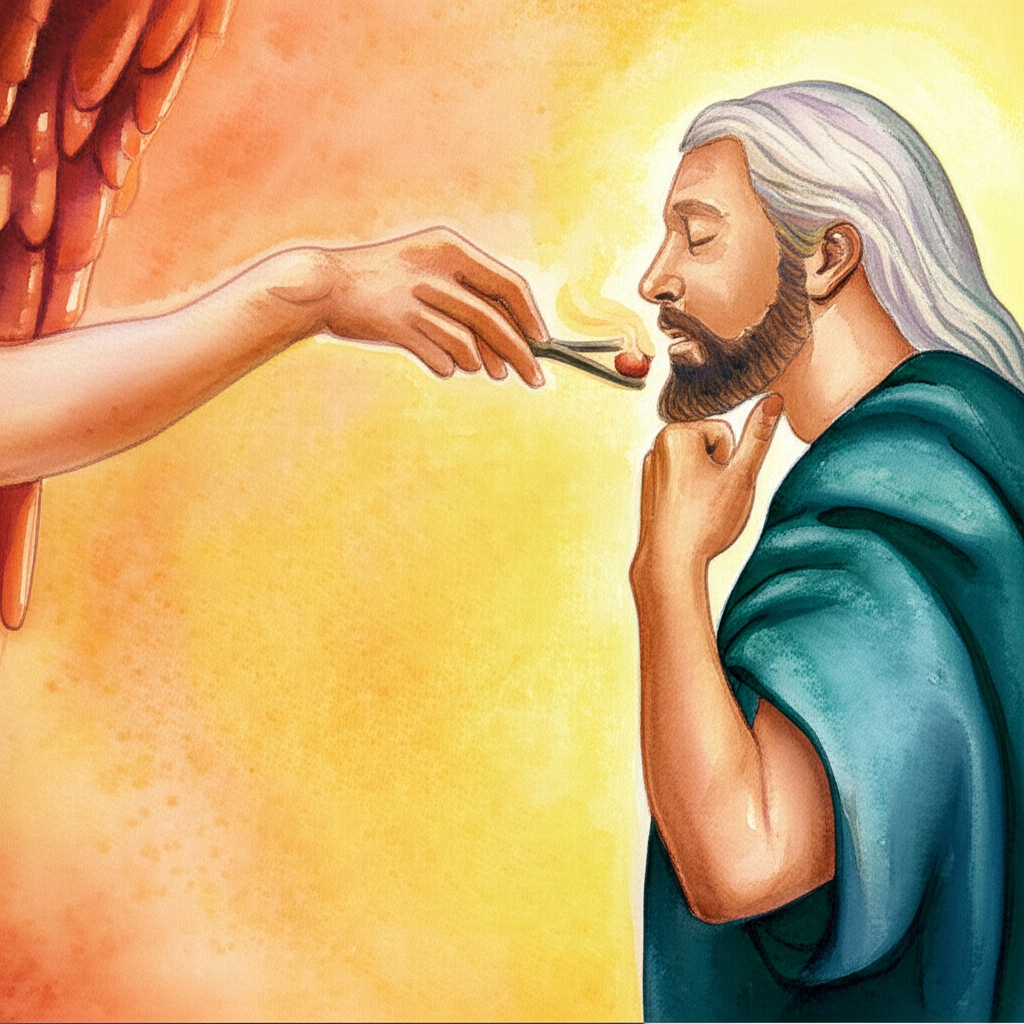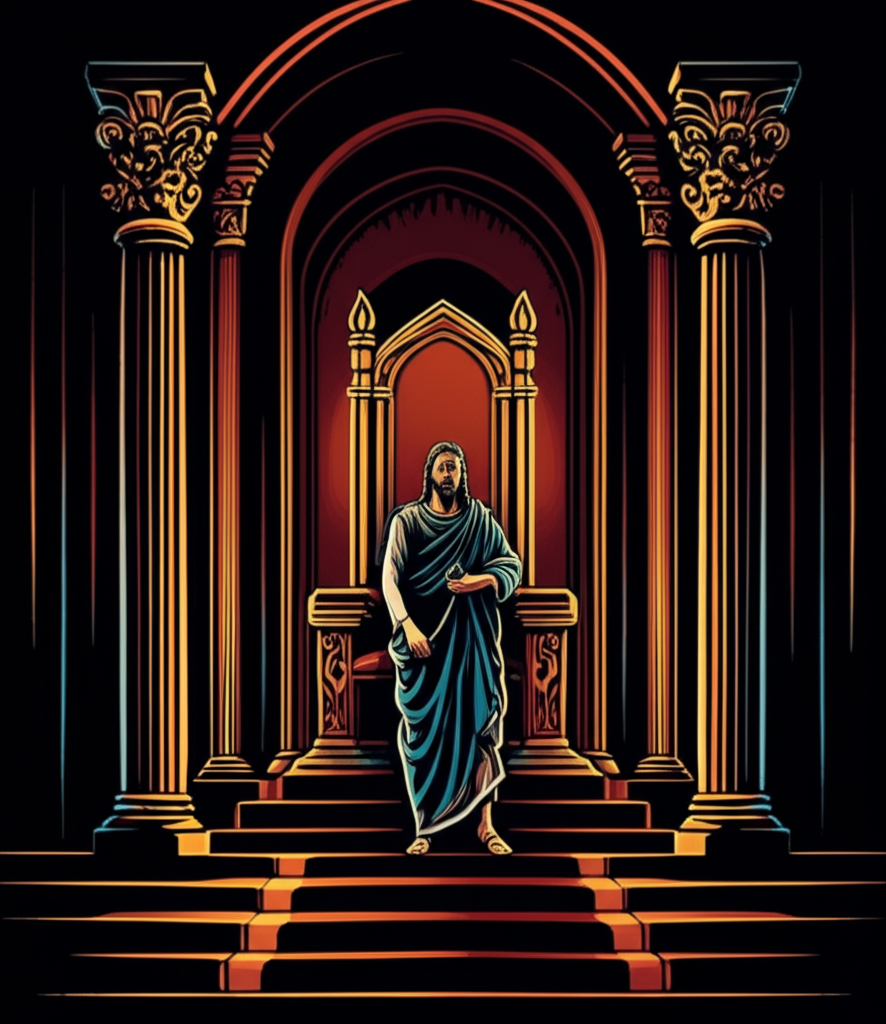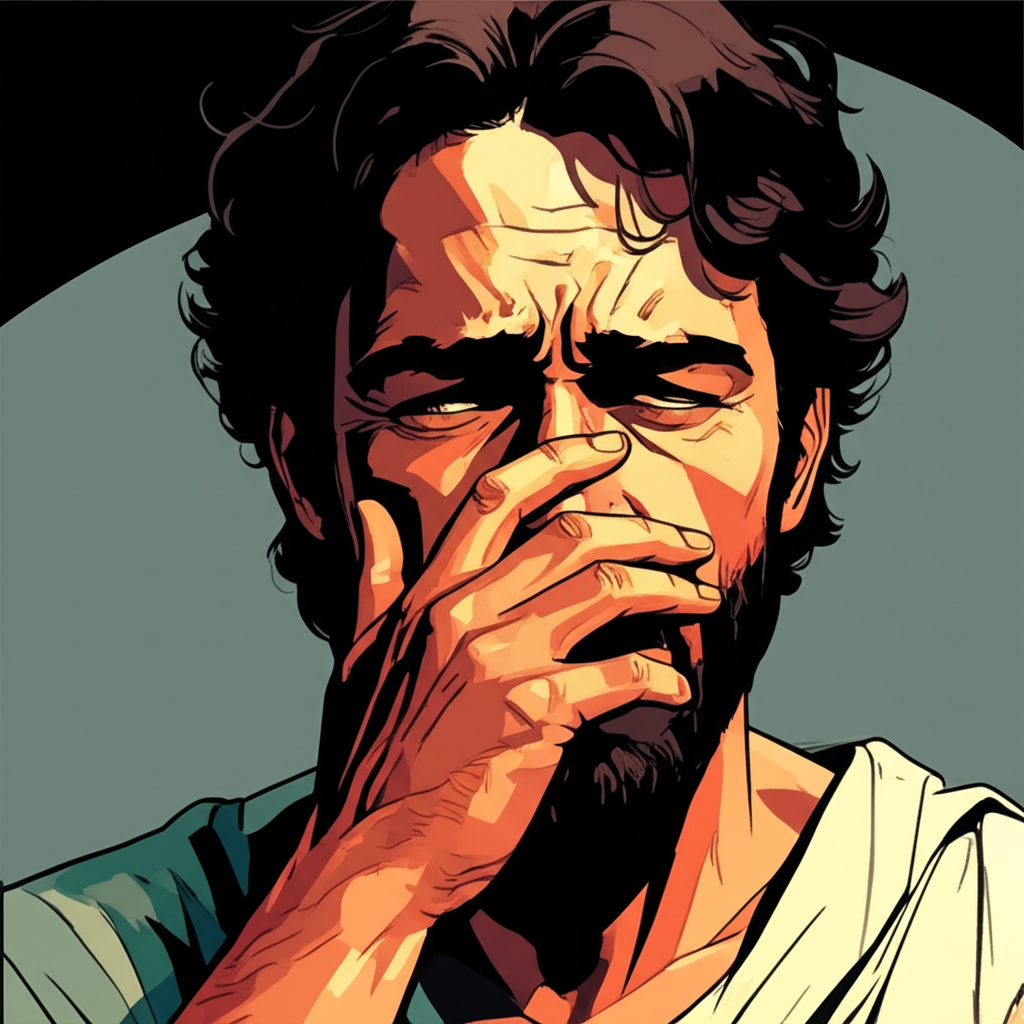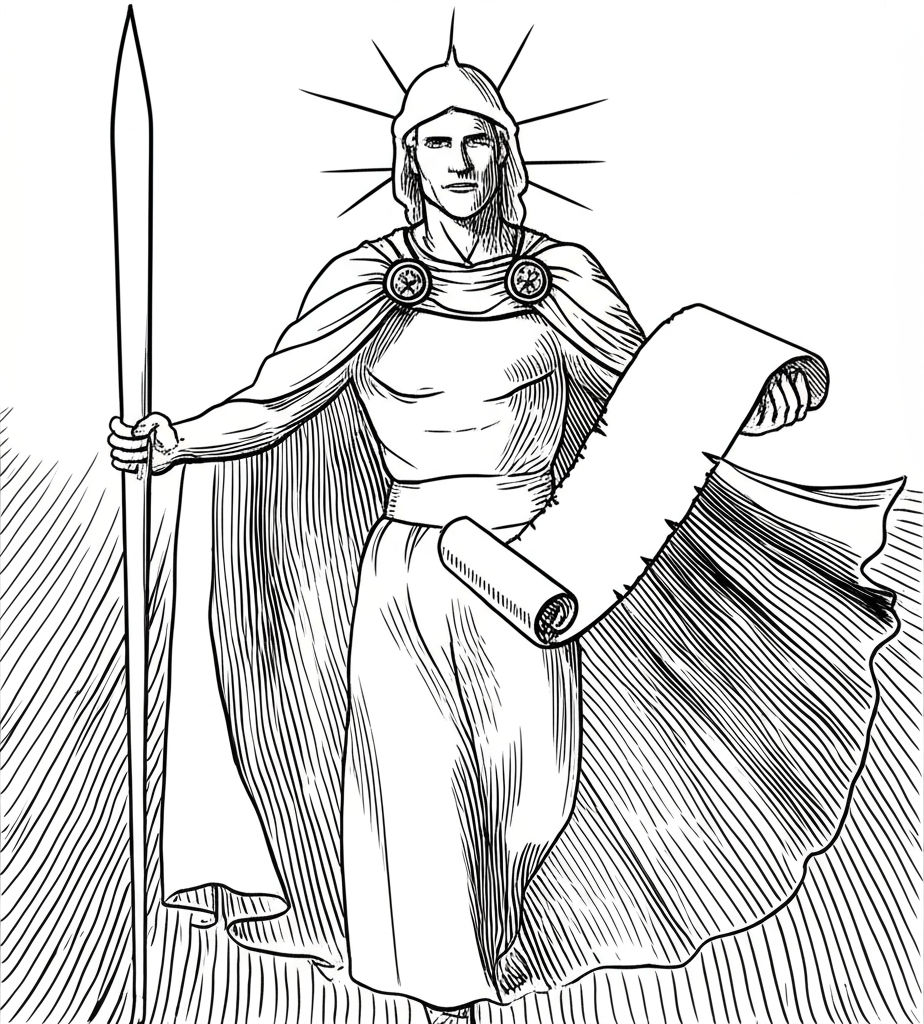Isaiah 6 meaning explained in AI Summary
Isaiah chapter 6 details Isaiah's vision of God in the Temple and his subsequent call to be a prophet.
1. Vision of God's Glory (vv. 1-4): Isaiah sees the Lord seated on a high and exalted throne. The train of His robe fills the Temple. Angelic beings called seraphim surround Him, proclaiming His holiness and power. The sheer magnificence of the scene shakes the Temple to its foundations.
2. Isaiah's Unworthiness (vv. 5-7): Overwhelmed by God's holiness, Isaiah becomes acutely aware of his own sinfulness and unworthiness. He cries out, acknowledging his unclean lips and belonging to a people of unclean lips. One of the seraphim touches Isaiah's lips with a burning coal from the altar, symbolizing purification and atonement for his sin.
3. Call to Prophetic Ministry (vv. 8-13): God asks, "Whom shall I send? And who will go for us?" Isaiah, now cleansed and empowered, responds with unwavering faith, "Here am I. Send me!" God commissions him to deliver a difficult message to the people of Judah. He warns Isaiah that his message will be largely ignored and will lead to their hardening of hearts and eventual judgment. However, God promises a remnant will remain faithful.
Key Themes:
- God's Holiness and Glory: The chapter emphasizes God's transcendent majesty and power, inspiring awe and reverence.
- Human Sinfulness: Isaiah's encounter highlights the stark contrast between God's holiness and human sinfulness.
- Cleansing and Forgiveness: The seraph's act of purification signifies God's willingness to forgive and cleanse those who come to Him in humility.
- Costly Obedience: Isaiah's call demonstrates the cost of following God, requiring courage and a willingness to face opposition.
- Hope in Judgment: Even amidst judgment, God preserves a faithful remnant, offering a glimmer of hope for the future.
Significance:
This chapter is pivotal in understanding Isaiah's ministry and message. It lays the foundation for his pronouncements of both judgment and future hope for Israel. It also serves as a powerful reminder of God's holiness, our need for cleansing, and the importance of responding to His call.
Isaiah 6 bible study ai commentary
Isaiah 6 unfolds as a pivotal Old Testament theophany, marking Isaiah's divine call to prophetic ministry. It powerfully contrasts the fading glory of an earthly king with the supreme, transcendent holiness of the eternal King, Yahweh. This vision reveals the chasm between divine perfection and human sinfulness, yet demonstrates that the path to service is paved not by human merit but by God's gracious atonement. The chapter culminates in a paradoxical commission of judgment that hardens the rebellious, yet preserves a "holy seed," a remnant of hope for God's ultimate redemptive plan.
Isaiah 6 context
The prophecy is precisely dated to 740 B.C., "the year that King Uzziah died." Uzziah's 52-year reign was a period of great prosperity and stability for Judah, but it ended in disgrace when the king, in his pride, unlawfully entered the temple to burn incense and was struck with leprosy (2 Chronicles 26). His death signaled the end of an era and the beginning of a period of political instability with the looming threat of the aggressive Assyrian empire. Isaiah's vision of the true King enthroned in the temple stands in stark, immediate contrast to the failure and death of the earthly king who defiled it.
Isaiah 6:1
In the year that King Uzziah died I saw the Lord sitting upon a throne, high and lifted up; and the train of his robe filled the temple.
In-depth-analysis
- A Vision of the True King: With the human throne of Judah vacant or in disgrace, Isaiah sees the real King,
Adonai(the Lord), whose reign is eternal and absolute. - High and lifted up: This phrase emphasizes God's supreme sovereignty, exaltation, and transcendence over all creation, including earthly rulers. It directly echoes language used for the Suffering Servant later in Isaiah (Isa 52:13).
- The Throne: The vision is set in the temple, the symbolic dwelling place of God on earth. However, the vision's scale transcends the physical building. God isn't contained by the temple; He fills it and the cosmos.
- Train of his robe: This signifies immense majesty, glory, and honor. His royal splendor is so vast that just the hem of His robe fills the holiest place on earth.
Bible references
- John 12:41: 'Isaiah said these things because he saw his glory and spoke of him.' (Direct NT interpretation that Isaiah saw the pre-incarnate Christ).
- 1 Kings 22:19: 'Micaiah said, “...I saw the LORD sitting on his throne, and all the host of heaven standing beside him...”' (A prior throne room vision).
- Revelation 4:2: 'At once I was in the Spirit, and behold, a throne stood in heaven, with one seated on the throne.' (John's similar throne room vision).
Cross references
2 Chr 26:16-21 (Uzziah's pride and downfall); Psa 47:8 (God on His holy throne); Psa 113:4-6 (The LORD high above all nations); Dan 7:9 (The Ancient of Days takes his seat).
Isaiah 6:2-3
Above him stood the seraphim. Each had six wings: with two he covered his face, and with two he covered his feet, and with two he flew. And one called to another and said: “Holy, holy, holy is the LORD of hosts; the whole earth is full of his glory!”
In-depth-analysis
- Seraphim: The word (
saraph, pl.seraphim) means "burning ones," suggesting fiery purity, intensity, and their role as agents of purification. These are unique celestial beings mentioned only here. - Six Wings: Their posture communicates profound theological truths:
- Two covering the face: Humility and reverence. They cannot gaze directly on the full holiness of God.
- Two covering the feet: Acknowledgment of their creatureliness and unworthiness in the divine presence.
- Two for flying: Readiness for active, swift service and worship.
- Holy, holy, holy: This is the Trisagion ("thrice holy"). The threefold repetition in Hebrew signifies the ultimate degree, the very essence of God's nature. It points to His separateness, otherness, moral perfection, and awesome majesty.
- The LORD of hosts (
Yahweh Sabaoth): This name highlights His role as the commander of all heavenly and earthly armies and powers. - Glory (
kavod): God's glory is the external manifestation of His internal holiness. Though God is transcendent, His glory fills the entire created order.
Bible references
- Revelation 4:8: 'And the four living creatures... day and night they never cease to say, “Holy, holy, holy, is the Lord God Almighty...”' (Echoes the seraphim's chant in the final throne room vision).
- Exodus 3:5: 'Then he said, “Do not come near; take your sandals off your feet, for the place on which you are standing is holy ground.”' (The concept of holy presence).
- Numbers 21:6: 'Then the LORD sent fiery serpents (
seraphim) among the people...' (Shows the root wordsaraphconnected to "fiery" or "burning").
Cross references
Psa 29:1-2 (Ascribe glory to God); Psa 99:1-5 (The LORD is great and holy); Heb 1:7 (Makes His angels spirits and ministers a flame of fire); Hab 2:14 (Earth will be filled with the knowledge of God's glory).
Polemics
The vision of a living, speaking, glorious God, served by powerful celestial beings, stands as a direct polemic against the silent, lifeless, man-made idols of the surrounding nations. Israel's God is the sovereign, active ruler of the cosmos, not a localized deity confined to a statue.
Isaiah 6:4
And the foundations of the thresholds shook at the voice of him who called, and the house was filled with smoke.
In-depth-analysis
- Thresholds shook: The very foundations of the temple tremble, not from an earthquake, but at the sound of a created being's voice praising God. This demonstrates the immense power reverberating from the divine presence.
- Filled with smoke: This is a classic element of a theophany (a visible manifestation of God). Smoke signifies God's unapproachable glory, mystery, and the terror of His presence. It also evokes His judgment, as in the burning of a city. This directly recalls God's descent on Mount Sinai.
Bible references
- Exodus 19:18: 'Now Mount Sinai was wrapped in smoke because the LORD had descended on it in fire... and the whole mountain trembled greatly.' (The quintessential Old Testament theophany).
- Revelation 15:8: 'and the sanctuary was filled with smoke from the glory of God and from his power...' (Shows the continuation of this imagery in end-times judgment).
- 1 Kings 8:10-11: 'And when the priests came out of the Holy Place, a cloud filled the house of the LORD... for the glory of the LORD filled the house...' (The dedication of Solomon's Temple).
Cross references
Psa 18:7-8 (Smoke from His nostrils); Exo 40:34-35 (Glory filling the tabernacle); Amos 9:1 (Strike the capitals until the thresholds shake).
Isaiah 6:5
And I said: “Woe is me! For I am lost; for I am a man of unclean lips, and I dwell in the midst of a people of unclean lips; for my eyes have seen the King, the LORD of hosts!”
In-depth-analysis
- Woe is me!: The prophetic cry of judgment is first turned upon the prophet himself. Seeing God's holiness instantly reveals his own profound sinfulness.
- I am lost/undone: The Hebrew
nidmeticonveys a sense of being ruined, silenced, or brought to nothing. In the face of ultimate reality, his own reality crumbles. - Man of unclean lips: Lips represent speech, which for a prophet is everything. Isaiah recognizes that his entire being, including the tool of his trade, is corrupted by sin and unfit for the presence of the Holy One.
- A people of unclean lips: He doesn't claim moral superiority. He immediately identifies his own sin with the corporate sin of his nation, Israel.
- My eyes have seen the King: This is the reason for his terror. The biblical principle is that no sinful human can see God in His unveiled glory and live (Exo 33:20). He has seen the supreme authority and is undone by the sight.
Bible references
- Luke 5:8: 'But when Simon Peter saw it, he fell down at Jesus' knees, saying, “Depart from me, for I am a sinful man, O Lord.”' (The same reaction to seeing divine power in Christ).
- Job 42:5-6: 'I had heard of you by the hearing of the ear, but now my eye sees you; therefore I despise myself, and repent in dust and ashes.' (Seeing God leads to self-abhorrence and repentance).
- Exodus 33:20: 'But,” he said, “you cannot see my face, for man shall not see me and live.”' (The principle Isaiah thought was now upon him).
Cross references
Jdg 6:22 (Gideon fears death after seeing an angel); Jdg 13:22 (Manoah's fear); Dan 10:8-9 (Daniel's strength leaves him); Rev 1:17 (John falls down as though dead).
Isaiah 6:6-7
Then one of the seraphim flew to me, having in his hand a burning coal that he had taken with tongs from the altar. And he touched my mouth and said: “Behold, this has touched your lips; your iniquity is taken away, and your sin atoned for.”
In-depth-analysis
- Divine Initiative: Isaiah is paralyzed by his sin, but God takes the initiative to provide a remedy. Salvation and cleansing come from God.
- Altar: The coal is from the altar of sacrifice, the place of atonement in the temple cultus. This shows that forgiveness is based on a sacrifice.
- Burning Coal: What should have destroyed the sinner (fire) becomes the instrument of his purification. This paradox illustrates the nature of God's grace—it is a holy and consuming fire that, when applied by God, purges rather than incinerates.
- Touched my mouth: The cleansing is applied directly to the source of his confessed uncleanness (his lips), commissioning him for a holy purpose.
- Iniquity taken away...sin atoned for (
tekupar): This is the language of priestly atonement. The Hebrew word is related to the covering or purging of sin. His sin is not just overlooked; it is dealt with decisively.
Bible references
- Jeremiah 1:9: 'Then the LORD put out his hand and touched my mouth. And the LORD said to me, “Behold, I have put my words in your mouth.”' (God preparing another prophet's mouth for service).
- Hebrews 9:14: 'how much more will the blood of Christ... purify our conscience from dead works to serve the living God.' (The ultimate fulfillment of atonement, cleansing for service).
- Leviticus 16:30: 'For on this day shall atonement be made for you to cleanse you from all your sins...' (The Day of Atonement theology).
Cross references
Psa 51:7 (Purge me with hyssop); Mic 7:18-19 (Who is a God like you, pardoning iniquity?); Zec 3:3-5 (The high priest Joshua's filthy garments are replaced).
Isaiah 6:8
And I heard the voice of the Lord saying, “Whom shall I send, and who will go for us?” Then I said, “Here am I! Send me.”
In-depth-analysis
- I... and ...Us: The voice of the Lord shifts from singular to plural. Christian theology sees this as a clear intra-biblical hint of the Trinity (Father, Son, Holy Spirit in unified counsel). Jewish scholarship often interprets it as a plural of majesty or God addressing the heavenly council (the seraphim).
- An Invitation, Not a Command: God asks a rhetorical question to the heavenly court, seeking a volunteer. He wants willing service, not forced conscription.
- Here am I! Send me:
Hineni shlacheni.Forgiven and cleansed, Isaiah's fear is replaced with bold availability. His response is immediate, personal, and unconditional. This is the model response of a servant of God.
Bible references
- Genesis 1:26: 'Then God said, “Let us make man in our image, after our likeness.”' (Another instance of the divine plural).
- Exodus 3:4, 10: 'God called to him... “Here I am.” ... “Come, I will send you to Pharaoh...”' (Moses' similar call, combining availability with a divine sending).
- 1 Samuel 3:10: 'And the LORD came and stood, calling as at other times, “Samuel! Samuel!” And Samuel said, “Speak, for your servant hears.”' (The posture of a willing servant).
Cross references
Gen 11:7 (Let us go down); Mat 28:19 (The Trinitarian formula in the Great Commission); Act 9:6, 10 (Saul's and Ananias's response to the Lord's call).
Isaiah 6:9-10
And he said, “Go, and say to this people: “‘Keep on hearing, but do not understand; keep on seeing, but do not perceive.’ Make the heart of this people dull, and their ears heavy, and blind their eyes; lest they see with their eyes, and hear with their ears, and understand with their hearts, and turn and be healed.”
In-depth-analysis
- A Devastating Commission: Isaiah's first assignment is not to spark revival but to preach a message that will have a hardening effect on an already rebellious people.
- The Nature of the Message: The preaching itself acts as a judicial tool. For those with receptive hearts (the remnant), it brings life. For those with hardened hearts, it confirms their rebellion and seals their judgment. The message exposes the pre-existing spiritual condition.
- Make the heart...dull: The prophet is not the ultimate cause of the hardening; God is. Yet the prophetic word is the instrument God uses to bring it about. This is a profound mystery of divine sovereignty and human responsibility.
- Lest they turn and be healed: This clause is the theological center. It shows that healing is available upon repentance, but the people are so entrenched in their sin that they will refuse to see, hear, or understand, thereby cutting themselves off from this healing.
Bible references
- Matthew 13:14-15: 'Indeed, in their case the prophecy of Isaiah is fulfilled...' (Jesus quotes this text to explain why He taught in parables and why many rejected Him).
- Acts 28:26-27: '“Go to this people, and say, ‘You will indeed hear but never understand...’”' (Paul's final quotation in Acts, applying it to Jews in Rome who rejected the gospel).
- Romans 1:24: 'Therefore God gave them up in the lusts of their hearts to impurity...' (The principle of God's judicial abandonment).
Cross references
Mar 4:12; Luk 8:10; Joh 12:40 (All gospels reference this hardening); Rom 11:7-8 (Paul on the hardening of Israel); 2Co 2:16 (Aroma of death to death).
Isaiah 6:11-12
Then I said, “How long, O Lord?” And he answered: “Until cities lie waste without inhabitant, and houses without people, and the land is a utter desolation, and the LORD has removed people far away, and the forsaken places are many in the midst of the land.”
In-depth-analysis
- How long, O Lord?: This is not a question of doubt, but a cry of intercessory anguish. Isaiah is grieved by the harshness of the judgment he must proclaim.
- Until...: The answer is absolute. The hardening and judgment will persist until the land has undergone a catastrophic purging—the complete desolation brought about by conquest and exile (first by Assyria, and ultimately by Babylon).
- Removed people far away: A clear prophecy of the coming exiles.
Bible references
- Psalm 74:10: 'How long, O God, is the foe to scoff? Is the enemy to revile your name forever?' (The cry of God's people under judgment).
- Jeremiah 25:11: 'This whole land shall become a ruin and a waste, and these nations shall serve the king of Babylon seventy years.' (The historical fulfillment of this type of prophecy).
- Luke 21:24: '...Jerusalem will be trampled underfoot by the Gentiles, until the times of the Gentiles are fulfilled.' (Jesus prophesying a long period of desolation).
Cross references
Lev 26:31-33 (Curses for disobedience including desolate land); Mic 3:12 (Zion plowed as a field); Psa 13:1.
Isaiah 6:13
And though a tenth remain in it, it will be burned again, like a terebinth or an oak, whose stump remains when it is felled.” The holy seed is its stump.
In-depth-analysis
- A Remnant within the Remnant: Even the "tenth" that survives the initial judgment will be subjected to further purification ("burned again").
- The Stump: The dominant image is a mighty tree clear-cut to a stump. While this looks like utter destruction, the life is in the stump. This is the central image of hope in the chapter. Judgment is not the final word.
- The Holy Seed (
zera kodesh): The very life in the stump is defined as a "holy seed." This is the remnant, preserved by God's grace, from whom will come future restoration and, ultimately, the Messiah (the Shoot from the stump of Jesse, Isa 11:1).
Bible references
- Isaiah 11:1: 'There shall come forth a shoot from the stump of Jesse, and a branch from his roots shall bear fruit.' (The Messianic fulfillment of the "stump" metaphor).
- Romans 11:5: 'So too at the present time there is a remnant, chosen by grace.' (Paul's doctrine of the remnant, rooted in this OT concept).
- Ezra 9:2: 'for they have taken some of their daughters to be wives... and the holy seed has mixed itself with the peoples of the lands.' (The concept of the remnant as a "holy seed" after the exile).
Cross references
Isa 4:2-3 (The Branch of the LORD); Isa 10:20-22 (The remnant of Israel); Rom 9:27 (Though Israel be as the sand, only a remnant will be saved).
Isaiah chapter 6 analysis
- The Gospel in the Vision: Isaiah 6 can be read as a paradigm of the gospel experience:
- Revelation: God reveals His supreme holiness (vv. 1-4).
- Conviction: Humanity recognizes its utter sinfulness and ruin in response (v. 5).
- Atonement: God provides a gracious, substitutionary cleansing (vv. 6-7).
- Commission: The cleansed sinner joyfully responds in willing service (v. 8).
- King Uzziah vs. King Jesus: The chapter's context provides a powerful Christological contrast. The failed human king (Uzziah) entered the temple in pride and was judged with death/uncleanness. The true divine King (Christ, per John 12:41) is seen in the temple, and His presence leads not to Isaiah's death, but to his cleansing and commission as a King-Priest.
- Divine Plurality ("Us"): The use of the plural in v. 8 ("who will go for us?") is part of a pattern in Scripture (Gen 1:26; 3:22; 11:7) that Christians understand as an early and mysterious self-disclosure of the Triune nature of the one God.
Isaiah 6 summary
In 740 B.C., the year a great earthly king died, Isaiah receives a stunning vision of the immortal King, the LORD, enthroned in glory. The holiness of God, praised by fiery seraphim, shatters Isaiah, revealing his deep sinfulness. But God does not destroy him; instead, He graciously atones for his sin with a coal from the altar. Cleansed and forgiven, Isaiah volunteers for service and receives a difficult commission: to preach a message that will judicially harden a rebellious people, leading to exile and desolation, yet with a firm promise that a "holy seed," a remnant stump, will survive to carry God's future hope.
Isaiah 6 AI Image Audio and Video









Isaiah chapter 6 kjv
- 1 In the year that king Uzziah died I saw also the LORD sitting upon a throne, high and lifted up, and his train filled the temple.
- 2 Above it stood the seraphims: each one had six wings; with twain he covered his face, and with twain he covered his feet, and with twain he did fly.
- 3 And one cried unto another, and said, Holy, holy, holy, is the LORD of hosts: the whole earth is full of his glory.
- 4 And the posts of the door moved at the voice of him that cried, and the house was filled with smoke.
- 5 Then said I, Woe is me! for I am undone; because I am a man of unclean lips, and I dwell in the midst of a people of unclean lips: for mine eyes have seen the King, the LORD of hosts.
- 6 Then flew one of the seraphims unto me, having a live coal in his hand, which he had taken with the tongs from off the altar:
- 7 And he laid it upon my mouth, and said, Lo, this hath touched thy lips; and thine iniquity is taken away, and thy sin purged.
- 8 Also I heard the voice of the Lord, saying, Whom shall I send, and who will go for us? Then said I, Here am I; send me.
- 9 And he said, Go, and tell this people, Hear ye indeed, but understand not; and see ye indeed, but perceive not.
- 10 Make the heart of this people fat, and make their ears heavy, and shut their eyes; lest they see with their eyes, and hear with their ears, and understand with their heart, and convert, and be healed.
- 11 Then said I, Lord, how long? And he answered, Until the cities be wasted without inhabitant, and the houses without man, and the land be utterly desolate,
- 12 And the LORD have removed men far away, and there be a great forsaking in the midst of the land.
- 13 But yet in it shall be a tenth, and it shall return, and shall be eaten: as a teil tree, and as an oak, whose substance is in them, when they cast their leaves: so the holy seed shall be the substance thereof.
Isaiah chapter 6 nkjv
- 1 In the year that King Uzziah died, I saw the Lord sitting on a throne, high and lifted up, and the train of His robe filled the temple.
- 2 Above it stood seraphim; each one had six wings: with two he covered his face, with two he covered his feet, and with two he flew.
- 3 And one cried to another and said: "Holy, holy, holy is the LORD of hosts; The whole earth is full of His glory!"
- 4 And the posts of the door were shaken by the voice of him who cried out, and the house was filled with smoke.
- 5 So I said: "Woe is me, for I am undone! Because I am a man of unclean lips, And I dwell in the midst of a people of unclean lips; For my eyes have seen the King, The LORD of hosts."
- 6 Then one of the seraphim flew to me, having in his hand a live coal which he had taken with the tongs from the altar.
- 7 And he touched my mouth with it, and said: "Behold, this has touched your lips; Your iniquity is taken away, And your sin purged."
- 8 Also I heard the voice of the Lord, saying: "Whom shall I send, And who will go for Us?" Then I said, "Here am I! Send me."
- 9 And He said, "Go, and tell this people: 'Keep on hearing, but do not understand; Keep on seeing, but do not perceive.'
- 10 "Make the heart of this people dull, And their ears heavy, And shut their eyes; Lest they see with their eyes, And hear with their ears, And understand with their heart, And return and be healed."
- 11 Then I said, "Lord, how long?" And He answered: "Until the cities are laid waste and without inhabitant, The houses are without a man, The land is utterly desolate,
- 12 The LORD has removed men far away, And the forsaken places are many in the midst of the land.
- 13 But yet a tenth will be in it, And will return and be for consuming, As a terebinth tree or as an oak, Whose stump remains when it is cut down. So the holy seed shall be its stump."
Isaiah chapter 6 niv
- 1 In the year that King Uzziah died, I saw the Lord, high and exalted, seated on a throne; and the train of his robe filled the temple.
- 2 Above him were seraphim, each with six wings: With two wings they covered their faces, with two they covered their feet, and with two they were flying.
- 3 And they were calling to one another: "Holy, holy, holy is the LORD Almighty; the whole earth is full of his glory."
- 4 At the sound of their voices the doorposts and thresholds shook and the temple was filled with smoke.
- 5 "Woe to me!" I cried. "I am ruined! For I am a man of unclean lips, and I live among a people of unclean lips, and my eyes have seen the King, the LORD Almighty."
- 6 Then one of the seraphim flew to me with a live coal in his hand, which he had taken with tongs from the altar.
- 7 With it he touched my mouth and said, "See, this has touched your lips; your guilt is taken away and your sin atoned for."
- 8 Then I heard the voice of the Lord saying, "Whom shall I send? And who will go for us?" And I said, "Here am I. Send me!"
- 9 He said, "Go and tell this people: "?'Be ever hearing, but never understanding; be ever seeing, but never perceiving.'
- 10 Make the heart of this people calloused; make their ears dull and close their eyes. Otherwise they might see with their eyes, hear with their ears, understand with their hearts, and turn and be healed."
- 11 Then I said, "For how long, Lord?" And he answered: "Until the cities lie ruined and without inhabitant, until the houses are left deserted and the fields ruined and ravaged,
- 12 until the LORD has sent everyone far away and the land is utterly forsaken.
- 13 And though a tenth remains in the land, it will again be laid waste. But as the terebinth and oak leave stumps when they are cut down, so the holy seed will be the stump in the land."
Isaiah chapter 6 esv
- 1 In the year that King Uzziah died I saw the Lord sitting upon a throne, high and lifted up; and the train of his robe filled the temple.
- 2 Above him stood the seraphim. Each had six wings: with two he covered his face, and with two he covered his feet, and with two he flew.
- 3 And one called to another and said: "Holy, holy, holy is the LORD of hosts; the whole earth is full of his glory!"
- 4 And the foundations of the thresholds shook at the voice of him who called, and the house was filled with smoke.
- 5 And I said: "Woe is me! For I am lost; for I am a man of unclean lips, and I dwell in the midst of a people of unclean lips; for my eyes have seen the King, the LORD of hosts!"
- 6 Then one of the seraphim flew to me, having in his hand a burning coal that he had taken with tongs from the altar.
- 7 And he touched my mouth and said: "Behold, this has touched your lips; your guilt is taken away, and your sin atoned for."
- 8 And I heard the voice of the Lord saying, "Whom shall I send, and who will go for us?" Then I said, "Here I am! Send me."
- 9 And he said, "Go, and say to this people: "'Keep on hearing, but do not understand; keep on seeing, but do not perceive.'
- 10 Make the heart of this people dull, and their ears heavy, and blind their eyes; lest they see with their eyes, and hear with their ears, and understand with their hearts, and turn and be healed."
- 11 Then I said, "How long, O Lord?" And he said: "Until cities lie waste without inhabitant, and houses without people, and the land is a desolate waste,
- 12 and the LORD removes people far away, and the forsaken places are many in the midst of the land.
- 13 And though a tenth remain in it, it will be burned again, like a terebinth or an oak, whose stump remains when it is felled." The holy seed is its stump.
Isaiah chapter 6 nlt
- 1 It was in the year King Uzziah died that I saw the Lord. He was sitting on a lofty throne, and the train of his robe filled the Temple.
- 2 Attending him were mighty seraphim, each having six wings. With two wings they covered their faces, with two they covered their feet, and with two they flew.
- 3 They were calling out to each other, "Holy, holy, holy is the LORD of Heaven's Armies!
The whole earth is filled with his glory!" - 4 Their voices shook the Temple to its foundations, and the entire building was filled with smoke.
- 5 Then I said, "It's all over! I am doomed, for I am a sinful man. I have filthy lips, and I live among a people with filthy lips. Yet I have seen the King, the LORD of Heaven's Armies."
- 6 Then one of the seraphim flew to me with a burning coal he had taken from the altar with a pair of tongs.
- 7 He touched my lips with it and said, "See, this coal has touched your lips. Now your guilt is removed, and your sins are forgiven."
- 8 Then I heard the Lord asking, "Whom should I send as a messenger to this people? Who will go for us?" I said, "Here I am. Send me."
- 9 And he said, "Yes, go, and say to this people, 'Listen carefully, but do not understand.
Watch closely, but learn nothing.' - 10 Harden the hearts of these people.
Plug their ears and shut their eyes.
That way, they will not see with their eyes,
nor hear with their ears,
nor understand with their hearts
and turn to me for healing." - 11 Then I said, "Lord, how long will this go on?" And he replied, "Until their towns are empty,
their houses are deserted,
and the whole country is a wasteland; - 12 until the LORD has sent everyone away,
and the entire land of Israel lies deserted. - 13 If even a tenth ? a remnant ? survive,
it will be invaded again and burned.
But as a terebinth or oak tree leaves a stump when it is cut down,
so Israel's stump will be a holy seed."
- Bible Book of Isaiah
- 1 The Wickedness of Judah
- 2 The Mountain of the Lord
- 3 Judgment on Judah and Jerusalem
- 4 The Branch of the Lord Glorified
- 5 The Vineyard of the Lord Destroyed
- 6 Isaiah's Vision of the Lord
- 7 Isaiah Sent to King Ahaz
- 8 The Coming Assyrian Invasion
- 9 For to Us a Child Is Born
- 10 Judgment on Arrogant Assyria
- 11 The Righteous Reign of the Branch
- 12 The Lord Is My Strength and My Song
- 13 The Judgment of Babylon
- 14 The Restoration of Jacob
- 15 An Oracle Concerning Moab
- 16 Send the lamb to the ruler of the land, from Sela, by way of the desert, to the
- 17 An Oracle Concerning Damascus
- 18 An Oracle Concerning Cush
- 19 An Oracle Concerning Egypt
- 20 A Sign Against Egypt and Cush
- 21 Fallen, Fallen Is Babylon
- 22 An Oracle Concerning Jerusalem
- 23 An Oracle Concerning Tyre and Sidon
- 24 Judgment on the Whole Earth
- 25 God Will Swallow Up Death Forever
- 26 You Keep Him in Perfect Peace
- 27 The Redemption of Israel
- 28 Judgment on Ephraim and Jerusalem
- 29 The Siege of Jerusalem
- 30 Do Not Go Down to Egypt
- 31 Woe to Those Who Go Down to Egypt
- 32 A King Will Reign in Righteousness
- 33 O Lord, Be Gracious to Us
- 34 Judgment on the Nations
- 35 The Ransomed Shall Return
- 36 Sennacherib Invades Judah
- 37 Hezekiah Seeks Isaiah's Help
- 38 Hezekiah's Sickness and Recovery
- 39 Envoys from Babylon
- 40 Comfort for God's People
- 41 Fear Not, for I Am with You
- 42 The Lord's Chosen Servant
- 43 Israel's Only Savior
- 44 Israel the Lord's Chosen
- 45 The great king Cyrus
- 46 The Idols of Babylon and the One True God
- 47 The Humiliation of Babylon
- 48 Israel Refined for God's Glory
- 49 The Servant of the Lord
- 50 Israel's Sin and the Servant's Obedience
- 51 The Lord's Comfort for Zion
- 52 The Lord's Coming Salvation
- 53 Who has believed our report
- 54 The Eternal Covenant of Peace
- 55 The Compassion of the Lord
- 56 Salvation for Foreigners
- 57 Israel's Futile Idolatry
- 58 True and False Fasting
- 59 Evil and Oppression
- 60 Arise Shine for your light has come
- 61 The Spirit of the Lord is upon me
- 62 Zion's Coming Salvation
- 63 The Lord's Day of Vengeance
- 64 Oh that you would rend the heavens and come down, that the mountains might
- 65 Judgment and Salvation
- 66 The Humble and Contrite in Spirit